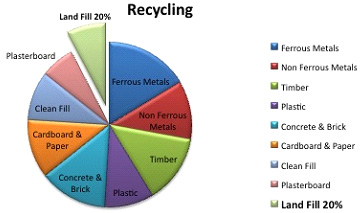Simply drive in, unload your waste and go… we’ll take care of the rest, our team of recyclers separate your rubbish into basic groups keeping as much as possible for other uses and only committing what little we can’t recycle to landfill.
Green Waste is sorted removing any contaminating waste and then mulched. It’s then taken to companies who further compost, screen and process it, creating a marketable and viable gardening product.
Concrete is dispatched to concrete recyclers to be crushed back into various grades of crushed concrete/crushed rock for use in road making and paving etc.
Timber products are sorted, removing waste and contaminants and also separating out any treated timber or processed particle boards. We then dispatch it for processing at a timber waste recycling facility. Timber Waste typically ends up as garden topping mulch often coloured for an aesthetic, stylish finish.
Soils are separated out, screened and dispatched as a fill product often to developments such as golf courses or to re-contour a site for building or landscaping purposes.
Paper is collected and dispatched for recycling (we provide a bin where you can deposit your paper). Please ensure it’s clean from metal, plastic and polystyrene packaging. Sellotape and staples etc. are acceptable. Paper must be stacked and boxes flattened to ensure no contamination within.
Bricks & Masonry are sorted, the fines (soils) removed and litter picked out creating a clean masonry product with some balled clay (that rolls over our screen).
Scrap Metals are sorted and dispatched for recycling. We also separate out where possible stainless, copper, brass, lead and aluminium and provide a pallet for used car batteries which are also sent off to be recycled. If disposing of car batteries at our transfer station, please ensure they are handled, then placed so as not to leak.
Rubbish is taken to landfill. Rubbish includes anything that is not recyclable or not economically viable to recycle. This includes materials such as particle board and laminates, carpets, plastics and polystyrenes, plaster and cement sheet, old and broken toys, televisions and electrical goods, cabinets, couches and chairs, glass, dirty recyclables such as green waste mixed with fencing wire or timber with steel or concrete attached, materials with plastic or shade cloth attached and painted timber.
All loads that are received through Kingston Transfer Station are sorted, categorised and, where viable, the constituent materials are sent for recycling.
It needs to be noted that recycling is not free or cheap. Almost every product we produce or separate out has a disposal cost. This cost includes transport as well as the sorting and handling costs and the cost of general business. Customers often comment on our cost to handle their waste, however like other private transfer stations we are yet to receive any grant’s, funding or help from any government or council departments. We are here to build a viable business and are very proud that we provide a recycling alternative to bulk gross landfill.
Kingston Waste Transfer Station does not accept any:
- Asbestos
- Hazardous, contaminated or dangerous materials.
- Prescribed waste or waste that could be harmful to persons or the environment
- Liquids, chemicals or wet paints
- Putrescibles (putrid) waste such as food scraps, household garbage, sewerage etc.
- Items still containing refrigeration gas or pressurised vessels
- Medical or biological waste
- Radioactive waste.

This group represents a monthly average of recycling.

